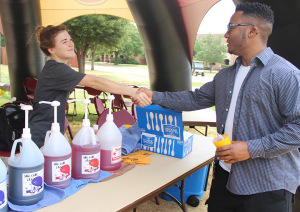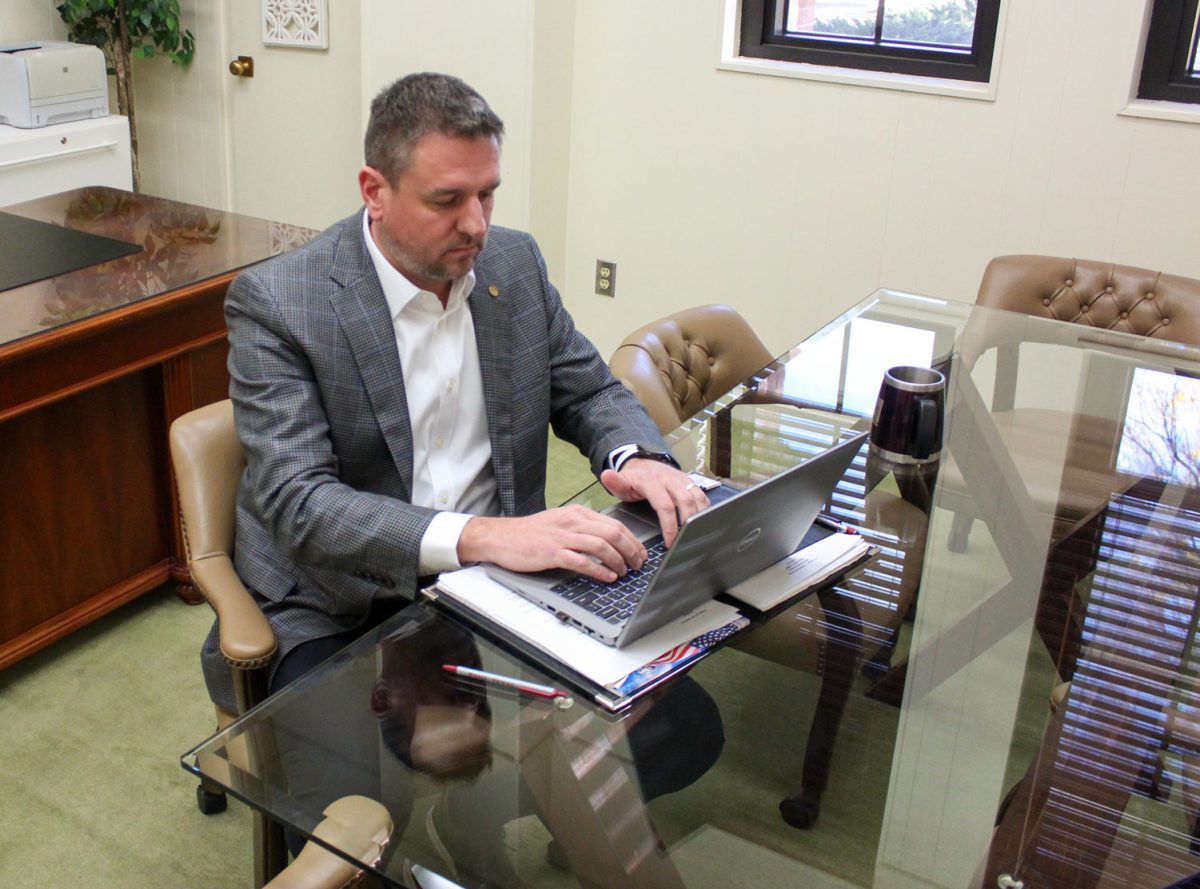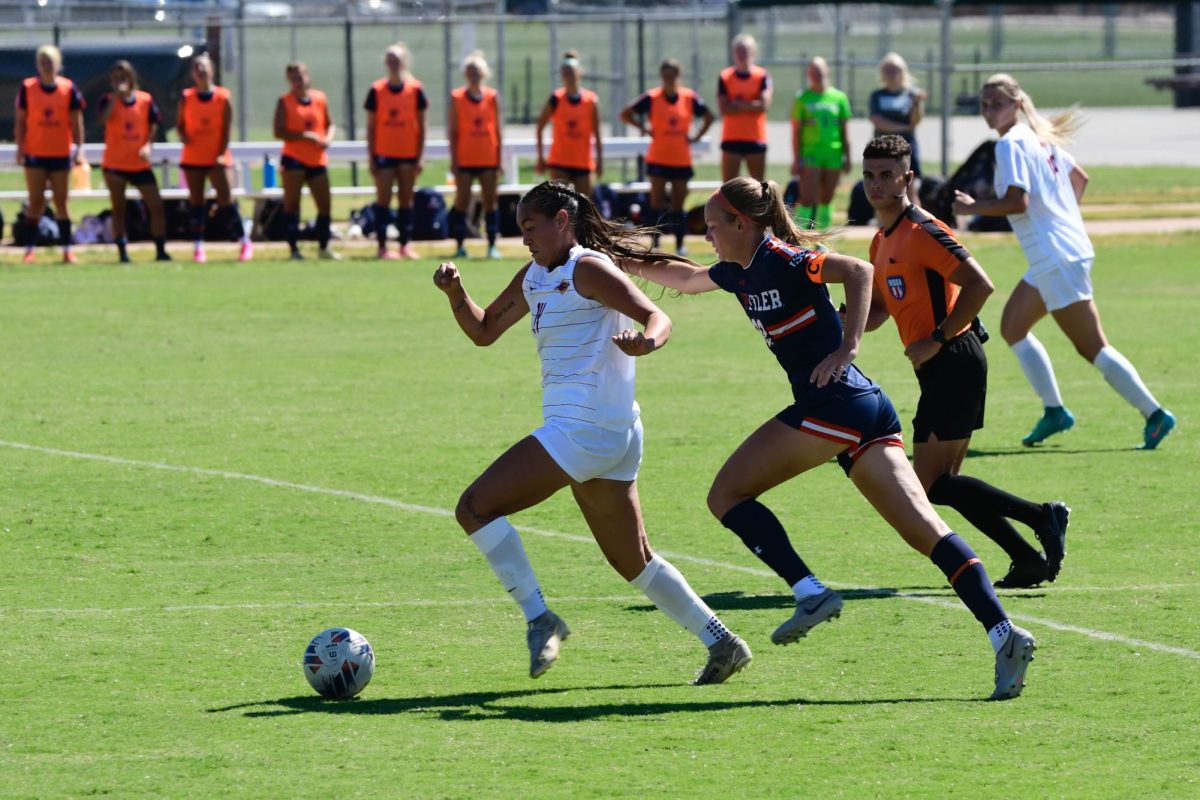
Though religious organizations on campus try their hardest to make students feel comfortable, some students may feel discriminated against. Because discrimination may be based on skin color, gender, political views, religion or sexual orientation, this might lead some people to ask, “Is there discrimination in religious organizations on campus, or are certain school ministries white-dominated?”
College is supposed to be about diversity and people trying new things, like meeting new people or getting involved in school organizations. However, people may feel vulnerable when it comes to new environments, as they do not know if they will be discriminated.
Ben Edfeldt, director of the Baptist Student Ministry, who helps lead Bible studies on campus and directs worship time, gave his thoughts on if there really is discrimination in religious organizations on campus.
Edfeldt said, “I don’t think there’s any discrimination there. I think sometimes discrimination is imagined, but when students walk into our doors or come to things we do on campus, there’s no set of rules they have to follow to be a part of who we are.”
Different students around campus said they also do not believe there is discrimination in the religious organizations on campus of any kind. Edfeldt did, however, mention one thing he believes people should do as a whole.
“We, as a culture, have to learn how to have disagreements and learn that sometimes we’re going to have different approaches to life. We will have different expectations on certain things, so we know that students will walk into our building and not believe, theologically, the same things that we believe, but we do not usher them out the door when they walk in. We invite those conversations, so I do not think discrimination is a reality there,” Edfeldt said.
As far as active student members of the organization go, Caleb Acuna, mechanical engineering senior and president of the leadership team for the Baptist Student Ministry, has been a part of the school ministry for all four years of his time at the university. He also gave his thoughts about discrimination in religious organizations.
“I don’t think discrimination is a word I would use myself. Because discrimination is who you are and, ‘I’m not going to accept you for who you are,’ in religious organizations, and while there’s a standard of morals that we try to live by, but the whole point of a religious organization is to teach people these are the standard of morals that I have,” Acuna said.”Here at BSM, if you don’t believe in our standard of morals or belief system, it’s not like you can’t come or you can’t befriend us.”
Acuna went on to discuss how people will not be judged or discriminated against at the ministry because their beliefs may be different.
“The whole point of you coming is if you want to be part of it, then please come join it, but if you don’t have the same beliefs, it’s not like we’ll tell you to get out of here and we won’t tell you that you’re wrong,” he said. “Another reason to have a religious organization is so that people that don’t share that same faith and don’t share the same values can explore it.”
Religion is a subject people may find hard to talk about. And discrimination within religious organizations on campus is something people have a difference of opinion on.
Cindy Reyes, junior and social work major, said, “Personally, I don’t view Christianity as a religion. I see it more like a relationship, so I think we are very inclusive and allow anyone to come into our doors. I don’t think there’s any sort of discrimination at all.”
Reyes and Acuna said they do not know anyone that has left a religious organization on campus because they felt uncomfortable or discriminated against, to their knowledge. Reyes did say there could be a possibility that people have left organizations for that reason, but it’s hard to say if people will come out and tell anyone.
“We have had certain instances where people don’t believe what we believe in, and because they don’t believe in Christ or the resurrection, they may feel uncomfortable because it is not the same,” Reyes said, “I believe difference of opinion is a way people can get confused with the word discrimination. I believe people will use discrimination as a loose term. It’s easy, if you’re offended, to label that difference of opinion as discrimination.”
For people that may have felt, or still feel like they are being discriminated against in a school religious organization, Edfeldt, Acuna and Reyes all gave their ideas on what they would say to someone.
Reyes said, “The first thing I would ask someone is why they feel discriminated against or why they feel uncomfortable in the ministry. I would also ask if it was something that we said or I said. Another thing I would ask is if there is anything we could do to make them not feel discriminated against.”
Acuna was adamant he gets the biggest issue out of the way, and see why a person may feel discriminated against in a religious organization.
“I would want to ask them why they feel that way because if it really is someone making a person feel uncomfortable, then we really need to change things. A lot of times, people have this is preconceived idea that because they aren’t Christian or they are not as faithful or they are a certain ethnicity, that it could be discrimination, but really their comfort is a different issue,” Acuna said. “So, what I would want to do is ask them what the real issue was. If it is really that someone is discriminating you, then we have got to do something, but if we just talk to them and find the real issue, it would help the situation.”
Reyes and Acuna both talked about how important school ministries are to students and the campus community. They discussed how it is all about building a relationship with Christ and how building a person’s faith is crucial.
Reyes said, “A thing that makes school ministries important is community. A lot of incoming freshmen or transfer students come in looking for a good community of friends who are genuine and look after each other, so I think that’s one of our primary focuses.”
Acuna said faith is what really made him want to join the Baptist Student Ministry.
“Faith is everything to me. I’m a Christian, and I believe in the Bible. I just saw that the BSM is a good organization that helps you grown in your faith,” said Acuna.
Edfeldt went into detail to talk about what he believes his job is as a director of a school ministry.
“Part of our responsibility is to make sure a student doesn’t feel uncomfortable or insecure in our environment. We want to make that person feels encouraged and welcomed here,” he said. “We may not do that well every day, but we do our best to make sure everyone feels welcomed here, but I think we also live in a culture where we like to say we have been discriminated against when we really haven’t. We just kind of feel entitled to say that.”
Edfeldt went a little deeper on the fact that people will have a difference of opinion, and that could be a reason people use the term discrimination to explain why they may leave a religious organization.
He said, “I think sometimes people look for that discrimination and will want to feel that, but that’s never something we invite, and it’s never something we want. We may not agree theologically with every student on our campus, but we must learn to cooperate with certain things, and there may be some things that we can’t see eye-to-eye on, but we are humans so we just have to learn how to handle that.”
Acuna and Reyes talked about how in their years involved in school ministries on campus, they have not had anyone come out and say they were discriminated against while in that environment. They also said they don’t believe that kind of environment has ever been presented to their knowledge.
Acuna said, “I can’t lie to say that anyone has left because they were feeling uncomfortable, but I wouldn’t call it discrimination. People have left for different reasons because we are all people, and we all make mistakes. The whole disagreement on beliefs could be a reason someone leaves, but I would not call it discrimination.”
Edfeldt mentioned what he believes is a big reason for people feeling uncomfortable or discriminated against in religious organizations.
“To be honest, anytime we are in new environments, religious or not, there is a sense of insecurity that we always have. If I walk into somebody else’s organization, there’s going to be a sense of, ‘Do I really belong here,’ so absolutely that’s going to happen when a student who may not be a Christian walks into our Thursday night Bible study and there’s going to be a level of insecurity that they are dealing with,” Edfeldt said. “That person may have a heightened sense because they don’t know if they follow that. They will think that they are different here, and that is going to be misinterpreted as discrimination.”
![]()
RELATED STORIES:
- The slow transition to becoming a Hispanic serving institution
- Ethnicity’s role in multicultural sororities
- LGBTQ: avoiding the trigger point
- Students fate uncertain pending a possible end to DACA
- Priddy Scholars brings new opportunities to first year students
- Girls choose their sorority based on fit, regardless of skin tone
- Rednecks: ‘It’s just a way of life’; ‘You get to yell, ‘yee yee’ whenever
- ADA compliance still an issue on campus with older buildings
- Greeks prey to stereotypes; still a ‘necessity’
- A 21st Century look at Discrimination
- Global enrollment continues to grow thanks to university’s outreach program
- Office becomes home to new director and students
- Brother realizes fraternity not understanding, welcoming
- Senate Bill 4 changes the way officials handle immigration












